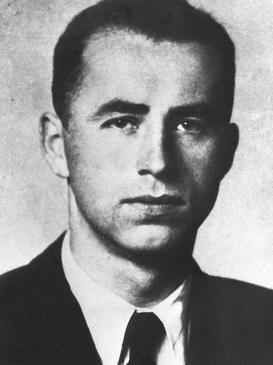Alois Brunner
(Nádkút/Rohrbrunn 1912 – unknown): Organiser of the Jewish deportations
Employee of the Central Office for Jewish Emigration from 1938 to 1941, from 1942 its director, organiser of the deportations from Vienna, Berlin, Saloniki, France and Slovakia.

Alois Brunner, son of a Burgenland farmer, was born on 8 April 1912 in what was then Hungary. After finishing his primary and secondary education he completed a commercial apprenticeship in Fürstenfeld. However, by his own admission he lost his job after joining the Nazi Party and the SA in 1931. He left Austria as early as September 1933 to pursue a career in the “Austrian Legion”, a Nazi paramilitary unit made up of Austrian exiles in the German Reich. He returned to Austria in 1938, joined the SS and was assigned to the Central Office for Jewish Emigration in November. That same year he met his wife there and moved with her into an “aryanised” villa in Döbling, Vienna’s 19th District.
From 1941 onwards, Brunner organised the deportations of Viennese Jews to the sites of Nazi genocide, first as Adolf Eichmann’s right-hand man, later as his successor as Head of the Central Office. On 9 October 1942 he reported that Vienna was “free of Jews”. As a specialist for the transports to the extermination sites, he was subsequently deployed in Berlin, then from February 1943 in Saloniki, then in Drancy, an assembly camp for French Jews near Paris. With the support of the Vichy regime, Alois Brunner was also responsible for deporting Jews from southern France from autumn 1943. From September 1944 he was in charge of the Sered concentration camp in Slovakia.
In 1945, Alois Brunner managed to go into hiding. Until 1954 he lived in Essen, Germany, under a false name, but fled Europe after being sentenced to death in absentia by two French courts. He lived in Damascus under the name “Dr. Georg Fischer” without ever being held to account, and worked there as a representative, arms supplier and informant of the Syrian secret service. The Austrian authorities were lax in their efforts to have him extradited to Austria, although Brunner even received visits from Austrian and German journalists. In 1961 and 1980, he survived two letter bomb assassination attempts.
From the 1990s onwards, efforts were stepped up to bring Brunner before a European court, but they failed because of the Syrian authorities or because Brunner had apparently gone into hiding. To this day, it is not entirely clear when Alois Brunner died; 2001 is probably the year of his death. Brunner remained an anti-Semite throughout his life and was known to brag about his complicity in the murder of hundreds of thousands of Jews.
Literature
Georg Hafner, Esther Schapira, Die Akte Alois Brunner, Frankfurt am Main 2000.
Hans Safrian, Die Eichmann-Männer, Vienna/Zurich 1993.
Hans Safrian, Eichmann und seine Gehilfen, Frankfurt am Main 1997.
Gabriele Anderl, Dirk Rupnow, Die Zentralstelle für jüdische Auswanderung als Beraubungsinstitution, Vienna/Munich 2004 (= Veröffentlichungen der Österreichischen Historikerkommission. Vermögensentzug während der NS-Zeit sowie Rückstellungen und Entschädigungen seit 1945 in Österreich, volume 20/1).
